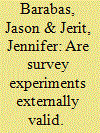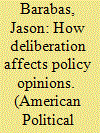| Srl | Item |
| 1 |
ID:
097016


|
|
|
|
|
| Publication |
2010.
|
| Summary/Abstract |
Researchers use survey experiments to establish causal effects in descriptively representative samples, but concerns remain regarding the strength of the stimuli and the lack of realism in experimental settings. We explore these issues by comparing three national survey experiments on Medicare and immigration with contemporaneous natural experiments on the same topics. The survey experiments reveal that providing information increases political knowledge and alters attitudes. In contrast, two real-world government announcements had no discernable effects, except among people who were exposed to the same facts publicized in the mass media. Even among this exposed subsample, treatment effects were smaller and sometimes pointed in the opposite direction. Methodologically, our results suggest the need for caution when extrapolating from survey experiments. Substantively, we find that many citizens are able to recall factual information appearing in the news but may not adjust their beliefs and opinions in response to this information.
|
|
|
|
|
|
|
|
|
|
|
|
|
|
|
|
| 2 |
ID:
059294


|
|
|
| 3 |
ID:
135961


|
|
|
|
|
| Summary/Abstract |
Political knowledge is a central concept in the study of public opinion and political behavior. Yet what the field collectively believes about this construct is based on dozens of studies using different indicators of knowledge. We identify two theoretically relevant dimensions: a temporal dimension that corresponds to the time when a fact was established and a topical dimension that relates to whether the fact is policy-specific or general. The resulting typology yields four types of knowledge questions. In an analysis of more than 300 knowledge items from late in the first decade of the 2000s, we examine whether classic findings regarding the predictors of knowledge withstand differences across types of questions. In the case of education and the mass media, the mechanisms for becoming informed operate differently across question types. However, differences in the levels of knowledge between men and women are robust, reinforcing the importance of including gender-relevant items in knowledge batteries.
|
|
|
|
|
|
|
|
|
|
|
|
|
|
|
|